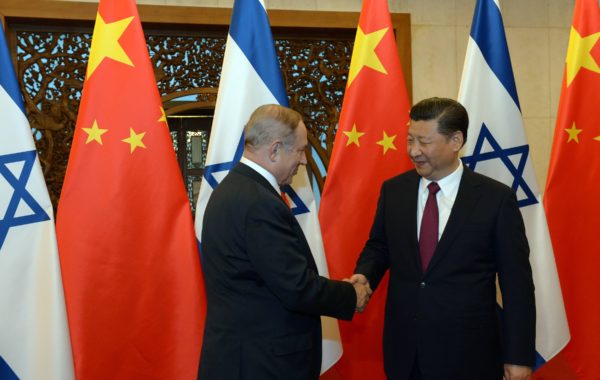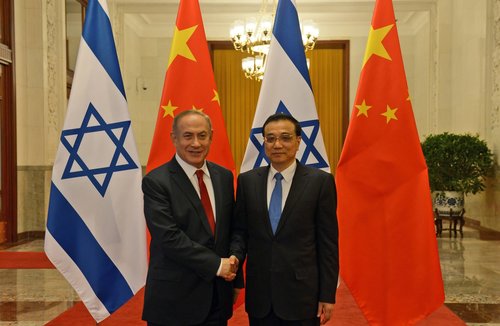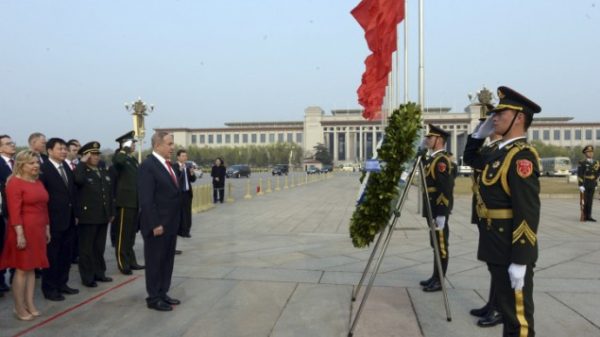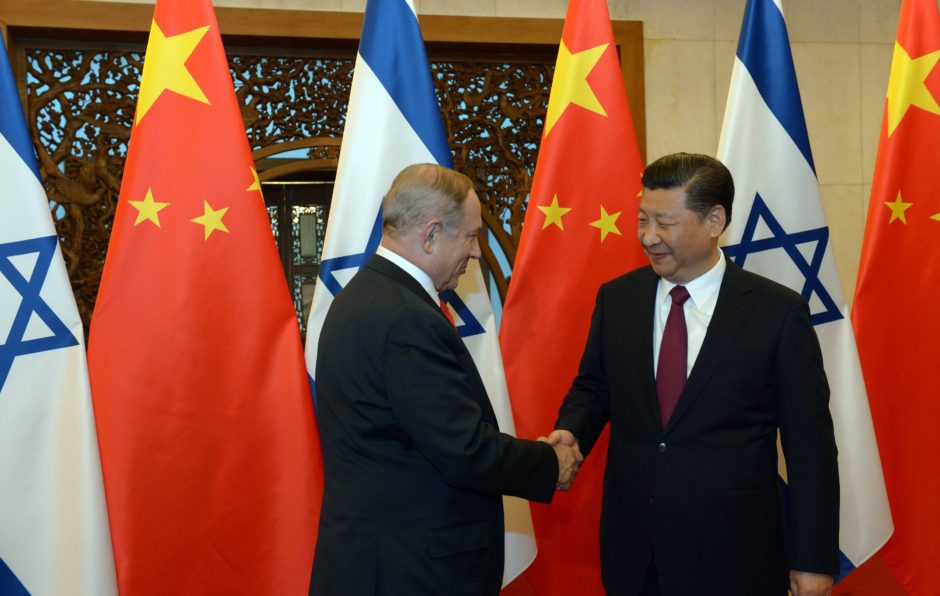Hoping to boost trade, Israeli Prime Minister Benjamin Netanyahu headed to China on March 19 for a three-day visit to the Asian economic giant, along with Israel’s largest-ever business delegation. The mission included five ministers in his government.
This was Netanyahu’s second visit to China in four years. Prior to his trip, Netanyahu, who’s also the country’s foreign minister, announced his intention to open two new bureaus in the Foreign Ministry, one for China and another for India.
He said the decision to establish China and India bureaus shows the “importance that we place on these two major powers.”

(Haim Zach / GPO)
Marking 25 years of relations with Beijing, Netanyahu met President Xi Jinping, Prime Minister Li Keqiang, and the head of the country’s parliament, Zhang Dejiang.
Accompanying Netanyahu were Environmental Protection Minister Ze’ev Elkin, Economy Minister Eli Cohen, Science, Technology and Space Minister Ofir Akunis,Health Minister Yaakov Litzman, and Agriculture Minister Uri Ariel.
The focus of the trip, according to Netanyahu’s office, was the “continued strengthening of economic cooperation with the Chinese government — increased Israeli exports to China, attracting Chinese investments in Israel, and increased industrial and research cooperation between Chinese and Israeli companies.”
Before taking off from Israel, Netanyahu told reporters that “Israel is a very sought-after nation, as you can tell from my recent visits to Washington, Moscow and many other countries, and now China.”
While the European Union remains Israel’s largest trading partner, Asia is steadily closing the gap and politically it tends to put far fewer demands on Israel than the EU does.
The Chinese and Israeli heads of government met in Beijing’s Great Hall of the People, where Prime Minister Li praised Israel’s advances, saying it was a world leader in some technologies. “The Chinese people and the Jewish people are both great peoples of the world,” he added.

Netanyahu chaired a business and innovation forum, attended by more than 500 participants from both countries, and told them that Israel is well-positioned to help China upgrade its products, services and utilities with better technology. “I believe this is a marriage made in heaven.”
Included were the heads of Chinese conglomerates like Baidu, Alibaba, Wanda and Lenovo. Netanyahu said that he expects investments and jobs in Israel from these companies.
Each of the Chinese businessmen Netanyahu met represents companies “with turnovers of tens of billions of dollars,” according to the Prime Minister’s Office. Baidu, for example, claims to be the leading search engine in China and one of the largest web services companies in the world, with its headquarters in Beijing.
A number of economic agreements in various fields such as aviation, education, science, health and environmental protection were signed to help Israeli get better access to Chinese markets.
As well, Netanyahu proposed the establishment of a fast track for Israeli and Chinese investors and also raised the possibility of a direct air link between Shanghai and Tel Aviv.
It’s a relationship that continues to blossom, and comes as the two countries continue negotiations over a free trade agreement, with another round of talks scheduled for July.
Deng Li, director general of the Chinese Foreign Ministry’s West Asian and North African Affairs Department, told a briefing that both countries had agreed to step up free trade talks. “Personally I am very confident and optimistic about the future of this free trade agreement,” Deng said.
Chinese Vice Premier Liu Yandong and Netanyahu noted that their countries have, during the latter’s current visit, agreed to upgrade the Innovative Comprehensive Partnership between them, which will bring raise bilateral cooperation to new heights.
China is investing in Israel’s hi-tech, agriculture, food, water, med-tech, and bio-tech industries. It is also involved in building infrastructure in Israel, such as digging the Carmel tunnels in Haifa, laying the light rail line in Tel Aviv, and expanding the Ashdod and Haifa seaports.
A deal for 6,000 Chinese construction workers to come to Israel was signed earlier this year, with the possibility of extending it to 20,000.
Since 2013, Israel has seen numerous delegations from the Chinese business community visit Israel. Last year, the Israeli Embassy in Beijing issued more than 10,000 visas to Chinese business people.

According to Chinese estimates, the country’s total investment in Israel in 2015 reached more than half a billion dollars.
China is also encouraging the establishment of Israeli innovative enterprises in China, such as Shouguang’s Water City, which incorporates Israeli water technologies. The establishment of a technological academic institute in Guangdong by the Technion, financed with a $130 million donation by billionaire Li Ka-shing, is another example of the role Chinese business people are playing in promoting bilateral relations.
More than half of China’s oil imports come from the Middle East, and as part of its One Belt One Road (OBOR) initiative, it is investing heavily in transportation infrastructures, such as roads, railroads, and sea ports, across Asia and the Middle East.
The initiative is meant to connect China to European and African markets, and is financed in part by the establishment of the Asian Infrastructure Investment Bank (AIIB), which Israel joined as soon as it was founded in 2015.
“Israel would like to participate in projects under the initiative and hopes China will contribute from its experience in infrastructure to help promote the stability and economic development in the Middle East,” Alexander B. Pevzner, founding director of the Chinese Media Center under the College of Management Academic Studies in Israel, told the Global Times of China.
China appears willing to approve Israel’s request to be exempt from a new Chinese policy barring investments in foreign countries. Currently, one-third of foreign investment in Israel comes from China, according to Netanyahu, who brought up the issue with President Xi.
The Chinese president also announced the establishment of a “Comprehensive Innovation Partnership” with Israel, which Netanyahu hailed as “a tremendously important decision.”
After the prime minister’s delegation returned to Israel on March 22, Eli Groner, the director-general of the Prime Minister’s Office, traveled to Guangzhou to represent Israel at the Baoa Forum for Asia (BFA), one of the continent’s most important economic conferences.
The purpose of BFA is to promote and deepen the economic exchange, coordination, and cooperation within Asia and between Asia and other parts of the world.
“In terms of magnitude, it’s like Davos,” according to Groner, who co-chairs the China-Israel joint economic task force, referring to the World Economic Forum’s annual meeting in Switzerland.
“People are familiar with Davos because the eyes of the word have been directed westward. But once people will start looking eastward they’ll recognize it’s one of the most important business forums in the world.”
“Like many other countries in the world — in the West, the East and even in our region — the Chinese are looking for Israeli ingenuity to help them with their security concerns, to feed their populations and to grow their economy,” indicated Groner.
China is Israel’s largest trading partner in Asia, and Israel’s exports to China have increased significantly over the last decade, going from just over $1 billion in 2007 to $3.3 billion in 2016. Overall bilateral trade volume has now surpassed $11 billion, more than 200 times higher than in 1992, when the two countries established diplomatic ties.
“But economic and trade cooperation hasn’t reached the limit, and there is still great potential for growth,” Chinese Minister of Science and Technology Wan Gang said at the forum hosted by Netanyahu.
Henry Srebrnik is a professor of political science at the University of Prince Edward Island.

